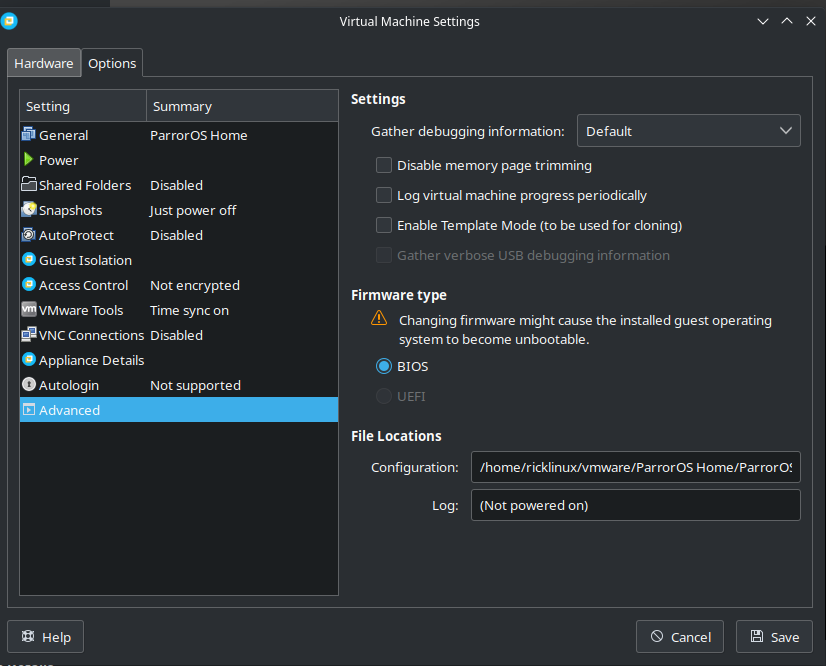Maybe it's because Parrot forcefully installs grub-legacy instead of regular grub. I copied that text too. Note: The bootmanager text is a mess because my Bios has no option to remove old entries
```text
└──╼ $sudo apt install grub
[sudo] password for parrot:
Reading package lists... Done
Building dependency tree... Done
Reading state information... Done
Note, selecting 'grub-legacy' instead of 'grub'
grub-legacy is already the newest version (0.97-77).
The following packages were automatically installed and are no longer required:
efibootmgr grub-efi-amd64-bin
Use 'sudo apt autoremove' to remove them.
0 upgraded, 0 newly installed, 0 to remove and 93 not upgraded.
┌─[parrot@parrot-notebook]─[~]
└──╼ $sudo efibootmgr -v
BootCurrent: 000C
Timeout: 1 seconds
BootOrder: 000C,0014,0005,0007,0008,000A,000B,0000,0009,000F,000E,0011,0001,0006,0013,000D,0004,0012,0003,0002,0010,0015
Boot0000* endeavouros-3189 HD(1,GPT,d82f9512-d125-074b-9fbf-b996bde6a1f8,0x1000,0x96000)/File(\EFI\ENDEAVOUROS-3189\GRUBX64.EFI)
Boot0001* endeavouros-3599 HD(1,GPT,d82f9512-d125-074b-9fbf-b996bde6a1f8,0x1000,0x96000)/File(\EFI\ENDEAVOUROS-3599\GRUBX64.EFI)
Boot0002 endeavouros-1999 HD(1,GPT,d82f9512-d125-074b-9fbf-b996bde6a1f8,0x1000,0x96000)/File(\EFI\ENDEAVOUROS-1999\GRUBX64.EFI)
Boot0003* endeavouros-1196 HD(1,GPT,d82f9512-d125-074b-9fbf-b996bde6a1f8,0x1000,0x96000)/File(\EFI\ENDEAVOUROS-1196\GRUBX64.EFI)
Boot0004* endeavouros-4978 HD(1,GPT,d82f9512-d125-074b-9fbf-b996bde6a1f8,0x1000,0x96000)/File(\EFI\ENDEAVOUROS-4978\GRUBX64.EFI)
Boot0005* endeavouros-2648 HD(1,GPT,d82f9512-d125-074b-9fbf-b996bde6a1f8,0x1000,0x96000)/File(\EFI\ENDEAVOUROS-2648\GRUBX64.EFI)
Boot0006* endeavouros-8053 HD(1,GPT,d82f9512-d125-074b-9fbf-b996bde6a1f8,0x1000,0x96000)/File(\EFI\ENDEAVOUROS-8053\GRUBX64.EFI)
Boot0007* UEFI OS HD(1,GPT,d82f9512-d125-074b-9fbf-b996bde6a1f8,0x1000,0x96000)/File(\EFI\BOOT\BOOTX64.EFI)..BO
Boot0008* endeavouros-6638 HD(1,GPT,d82f9512-d125-074b-9fbf-b996bde6a1f8,0x1000,0x96000)/File(\EFI\ENDEAVOUROS-6638\GRUBX64.EFI)
Boot0009* endeavouros-3652 HD(1,GPT,d82f9512-d125-074b-9fbf-b996bde6a1f8,0x1000,0x96000)/File(\EFI\ENDEAVOUROS-3652\GRUBX64.EFI)
Boot000A* endeavouros-7436 HD(1,GPT,d82f9512-d125-074b-9fbf-b996bde6a1f8,0x1000,0x96000)/File(\EFI\ENDEAVOUROS-7436\GRUBX64.EFI)
Boot000B* endeavouros-7932 HD(1,GPT,d82f9512-d125-074b-9fbf-b996bde6a1f8,0x1000,0x96000)/File(\EFI\ENDEAVOUROS-7932\GRUBX64.EFI)
Boot000C* Parrot HD(1,GPT,d82f9512-d125-074b-9fbf-b996bde6a1f8,0x1000,0x96000)/File(\EFI\PARROT\GRUBX64.EFI)
Boot000D* endeavouros-5145 HD(1,GPT,d82f9512-d125-074b-9fbf-b996bde6a1f8,0x1000,0x96000)/File(\EFI\ENDEAVOUROS-5145\GRUBX64.EFI)
Boot000E* endeavouros-7951 HD(1,GPT,d82f9512-d125-074b-9fbf-b996bde6a1f8,0x1000,0x96000)/File(\EFI\ENDEAVOUROS-7951\GRUBX64.EFI)
Boot000F* endeavouros-9556 HD(1,GPT,d82f9512-d125-074b-9fbf-b996bde6a1f8,0x1000,0x96000)/File(\EFI\ENDEAVOUROS-9556\GRUBX64.EFI)
Boot0010 endeavouros-7833 HD(1,GPT,d82f9512-d125-074b-9fbf-b996bde6a1f8,0x1000,0x96000)/File(\EFI\ENDEAVOUROS-7833\GRUBX64.EFI)
Boot0011* endeavouros-1749 HD(1,GPT,d82f9512-d125-074b-9fbf-b996bde6a1f8,0x1000,0x96000)/File(\EFI\ENDEAVOUROS-1749\GRUBX64.EFI)
Boot0012* debian HD(1,GPT,d82f9512-d125-074b-9fbf-b996bde6a1f8,0x1000,0x96000)/File(\EFI\DEBIAN\GRUBX64.EFI)
Boot0013* UEFI: PXE IP4 Intel(R) Ethernet Controller (3) I225-V PciRoot(0x0)/Pci(0x1c,0x0)/Pci(0x0,0x0)/MAC(50a1320bd737,1)/IPv4(0.0.0.00.0.0.0,0,0)..BO
Boot0014* endeavouros-2694 HD(1,GPT,d82f9512-d125-074b-9fbf-b996bde6a1f8,0x1000,0x96000)/File(\EFI\ENDEAVOUROS-2694\GRUBX64.EFI)
Boot0015 calculate HD(1,GPT,d82f9512-d125-074b-9fbf-b996bde6a1f8,0x1000,0x96000)/File(\EFI\CALCULATE\GRUBX64.EFI)
┌─[parrot@parrot-notebook]─[~]
